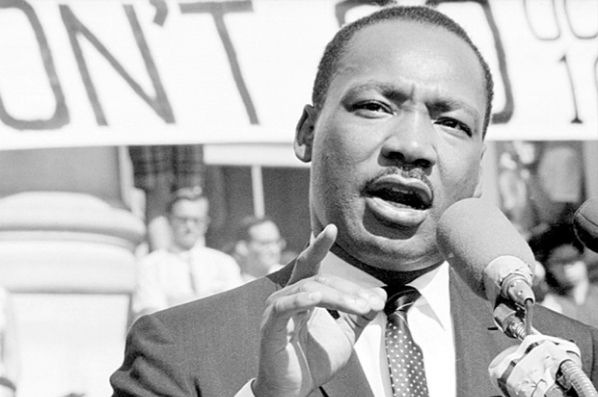Today, we remember Dr. Martin Luther King Jr. and applaud him as a man whose life contributed to freedom, justice, equality, and opportunity through non-violent, faith-based civil activism.
Rising from reluctant leader to international beacon of light, today, he is among those few remarkable human beings who have entered history’s stage during specific periods to deal with the hardship and injustice of the human condition. His “I Have a Dream” speech stands as the ideal of what our nation should be and has inspired generations across racial, political, economic, and social lines to achieve it.
However, you won’t hear the “I Have a Dream” speech in a movie such as the new movie “Selma” which depicts the civil rights movement through his eyes. In fact, you don’t hear many of his original writings or speeches in many settings because of the means in which the King Family, which owns his estate and his intellectual property, chooses to license usage of his likeness, words, and work.
We support copyrights and as the rightful property owners of Dr. King’s speeches and artifacts they can and should be as discriminating as they choose to be. However, past internal squabbles and external fights over the ownership and use of Dr. King’s work and property (including his Bible and Noble Prize) –even with Dr, King’s friends and allies from the movement – leave some to question the motivations of his family.
The New York Times opens an “Unsettling Chapter” in King’s legacy:
… a decidedly less heroic aspect of his legacy has been playing out here in court filings and hearings as his three surviving children work through a pair of lawsuits over the disputed ownership of their father’s Bible and Nobel Prize medal, and the licensing of his intellectual property.
The disputes are the latest in a series of dispiriting legal tussles involving Dr. King’s children, who have squabbled in the past among themselves — and with others — over the ownership of their father’s personal effects and the stewardship of his legacy. Along the way, they have found themselves at odds with some of Dr. King’s most famous friends and confidants, including Harry Belafonte, the actor and singer, and Andrew Young, the former United States ambassador to the United Nations and mayor of Atlanta.
…
Supporters of the family over the years have noted that Dr. King copyrighted his work, and meant it to retain value and offer sustenance for his family. His survivors have reportedly sought payment from CNN for the right to broadcast the “I Have a Dream” speech. In 2006, the family sold a trove of Dr. King’s documents for $32 million after a group of civic and business leaders, led by Atlanta’s then-mayor, Shirley Franklin, raised the money amid concerns that they would be auctioned off.
…
A number of lawsuits among the King siblings arose after their mother’s death in 2006. But by 2010, they appeared to have reconciled; Ms. King said that she was “proud that my brothers and I are speaking with one voice to communicate our parents’ legacy to the world.”
USAToday is not so kind. The editorial board opines:
While there are versions of one of the most renowned speeches in American history posted on YouTube, King's heirs generally limit the reach of their father's words and his image. They have deployed lawyers to sue those (including USA TODAY, CBS and the producers of a PBS documentary) who publish or broadcast his words without first paying a licensing fee. King's heirs even challenged singer Harry Belafonte — a close friend of King who helped support King's children after their father was assassinated in 1968 — to try to force him to give up documents Belafonte said he had been given.
…
At some point, though, the family's attempts to obtain value crossed the line from reasonable to embarrassing. Perhaps most appalling was the children demanding to be paid when their father was honored with a statue on the Mall. It's hard to imagine the heirs of others so honored — George Washington, for example, or the soldiers who died in Korea and Vietnam — insisting on a fee. It is a tawdry shadow on the legacy of one of America's most remarkable leaders.
There may be no way to convince King's heirs that they're tarnishing their father's legacy. King's friends have tried.
This is a battle of property rights and pecuniary remuneration. Everyone wants to claim some of Dr. King for themselves whether for political, financial, or personal motivations. That may not be such a bad thing if it inspires action and change that drives society forward.
However, property rights are a crucial aspect of the functioning of democracy. We create laws that protect a person’s belongings from being damaged or stolen by others. This is as true for store owners as it is for musicians. It’s the reason you don’t hear the Happy Birthday song played in formal settings or in mass media advertisements. The King Estate owns Dr. King’s items and words –and there is dispute over what they own- so it is their choice how and at what price they lend use of them.
If press outlets are not pleased that the cost of licensing the words of Dr. King are higher than they are willing to pay, that is one issue. However, if the real concern is about an inability to share the message of Dr. King (and those of others who create words that inspire, incite, or even entertain us), then that’s another discussion.
Let’s hope that the King Family will cease their own squabbling and unite to ensure that the Reverend King’s words are reasonably available to continue to inspire future generations.


